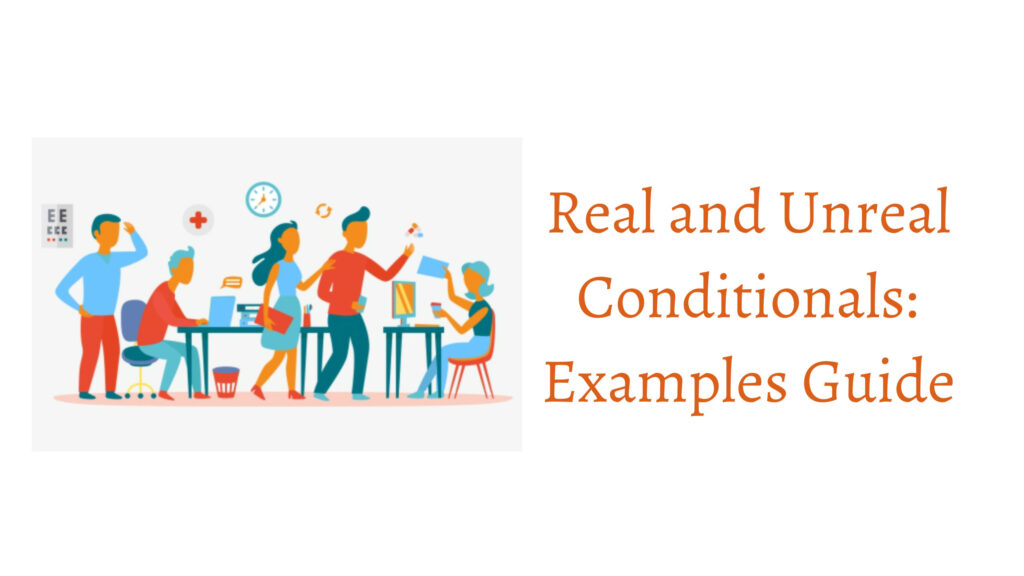In English grammar, the conditional forms are generally used to help the English learners to imagine certain events in certain conditions. These conditions will be helpful to you in speaking regarding real events or happenings or sometimes refer to imaginary events or imaginary past events.

With this guide we’ll try to cover the advanced concepts of real vs unreal conditional sentences.
Identifying Real and Imaginary Situations
Let’s have a look at some examples to understand if it is a real situation or just an imagination.
If you could finish your work early, we could go out for dinner.
This is called the first conditional sentence which is showing a possible situation.
If you had time we would have visited our friends.
This is called the second conditional – basically an imaginary situation.
If you had gone to Paris, you could have visited the art exhibition.
Now, this statement is called third conditional – and also referred to as the past imaginary situation.
So in the above statements, the real events refer to the first condition, the imaginary event refers to the second conditional and the imaginary past event refers to the third conditional.
For English learners or beginners, the study usually speaks about the situations that happen in the past, present and future. They are dependent on the other events that are happening.
Generally, in English grammar, there are four different forms of conditional statements in English. The students must be able to get an in-depth knowledge of all the conditionals and how to use them. Let’s discuss them in short.
- Zero Conditional: The situation is always true if something happens.
- Real Conditional: The situation or event would be true in the future if something happens.
- Unreal Conditional – Conditional Two: The situation would be true if something or the other happened in the present.
- Unreal Condition Or Conditional Three: It refers to the situation that would have been true in the past if some specific situation would have happened.
What are Real Conditional Sentences?
The real conditionals would refer to the actual situation which has the possibility of occurring in the past, present or future.
Examples of Real Conditionals
Let’s have a look at some examples of real conditionals.
- I play if there is nothing to do at home.
- If the weather is pretty, John walks to park.
- Derek helps me with my cooking when he has time.
- If I have a day off from work, I usually go for lunch.
- If I do not play, I usually study.
- I walk if there is something wrong with my car.
- If I go out for dinner, I usually take beer with me.
- If I cook, I usually make it spicy.
- I call him when I get time.
What are Unreal Conditional Sentences?
By definition, Unreal Conditionals refer to any hypothetical situation which would have no probability of happening in the past, present or future. It expresses the situation of what could or might have happened.
Unreasonable future terms are used to talk about future thinking situations. It’s not as common as the real future of the future because English speakers often leave open the possibility that anything could happen in the future.
Examples of Unreal Conditionals
Let’s have a quick look at sentence examples of unreal conditionals.
- If I were in New York, I would meet you.
- If I didn’t have to come to station, I would go to office.
- Had you participated in the contest, you could have won the first prize.
- Had they reached the airport on time, we could have met them before leaving.
- If Jack’s brother had visited me in the office, I could have given him all the books.
- The team would have helped you with the project if you had asked them earlier.
- If I had a billion dollars, I would buy a big house.
- Had Aric come on time, he would not miss the flight.
- If Jennifer had practiced harder, he could have performed better at the competition.
- If I were the President, I would work for the peace of the world.
- Had I been to the music convention yesterday, I could have seen your painting and drawings.
- If I were a painter, I would not charge him.
- Had I been to the concert, I could have enjoyed your performance.
- Had Alex a little bit sensible, he could have understood it.
- If I had a little more space on my phone, I could have downloaded the app.
We use past and present unreal conditionals to talk about wishes or expresses an hypothetical situation in past or present respectively.
Conclusion:
Now, you are familiar with both real as well as unreal conditionals. Make sure you understand the concept really well before making use of the contextual form. Stay Tuned To Englishbix.

